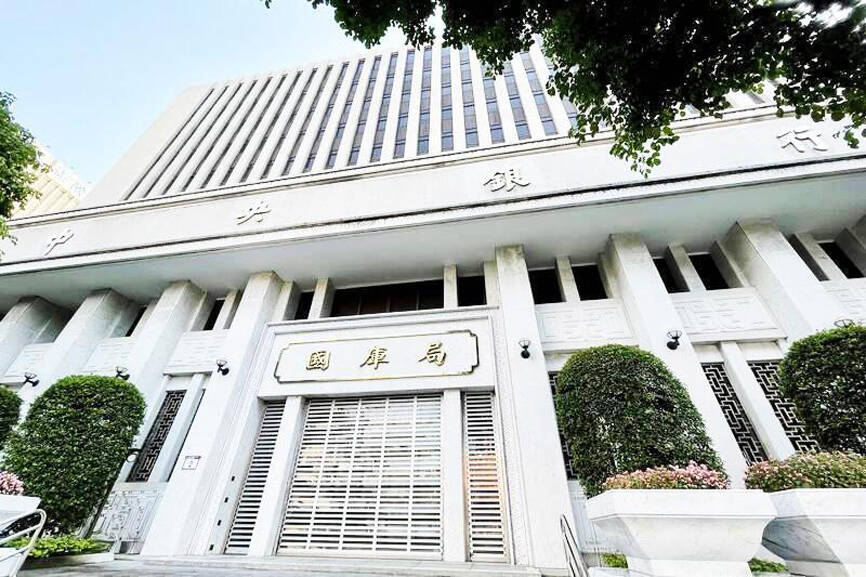The central bank yesterday suggested that the government approach Taiwan’s trade surplus with the US carefully, as the administration of US President Donald Trump plans to introduce reciprocal tariffs to address its trade imbalances with other nations.
Central bank Deputy Governor Chu Mei-lie (朱美麗) is to give a special report to the legislature’s Finance Committee today on potential US tariff hikes and Taiwan’s inclusion on the “Dirty 15” list of trade surplus nations.
Last year, the US recorded a US$73.9 billion trade deficit with Taiwan, making it the sixth-largest trade surplus source after China, Mexico, Vietnam, Ireland and Germany, the central bank said.

Photo: George Tsorng, Taipei Times
The central bank attributed the trade surpluses to intensifying US-China trade disputes and technology competition, the strengthening of cybersecurity and an ongoing artificial intelligence (AI) boom that together have boosted US demand for chips and information communications technology products.
“The vast amount of trade surplus raises concerns over trade frictions with the US,” the bank said.
By measure of simple average calculations, Taiwan’s tariffs are 3.2 percentage points higher than the US, although the gap is lower than that of India, South Korea, Thailand, Vietnam, China and Indonesia, the central bank said, citing WTO data.
However, Taiwan has lower tariffs than the US if judging by trade-weighted average tariffs, providing room for negotiation, it said.
Taiwan imposes relatively high tariffs on US agricultural products than non-agricultural products. It shipped US$890 million of agricultural products to the US last year, while importing US$3.69 billion, resulting in a trade deficit of US$2.8 billion in this sector, the central bank said.
That discrepancy could serve as negotiation leverage on the part of Taiwan during trade discussions, it suggested.
Canada and Mexico would take a hard hit from US tariffs, while Taiwan would see moderate repercussions, according to a study by Standard & Poor’s Global Ratings, after Trump threatened to impose a 25 percent tariff on its neighbors and an extra 10 percent tariff on other trade partners, the central bank said.
The US tariffs, if realized, would slow the world economy this year, the study added.
The US Department of the Treasury has sought to protect US interests and business sectors by releasing a semi-annual currency report in April and October to assess whether major trade partners manipulate their currencies to advance unfair trade practices, the central bank said.
Countries meeting two out of three criteria — a significant trade surplus, a large current account surplus and exchange rate interventions — are placed on the currency watch list, it said.
Taiwan has been on the watch list, but the central bank emphasized Taiwan’s foreign exchange interventions are intended to maintain currency stability rather than gain trade advantages, it said.
Countries that meet all three criteria are subject to economic sanctions.
The central bank said it keeps free and effective communication with the US, adding that the two sides would continue economic and currency policy exchanges based on mutual understanding.

TAKING STOCK: A Taiwanese cookware firm in Vietnam urged customers to assess inventory or place orders early so shipments can reach the US while tariffs are paused Taiwanese businesses in Vietnam are exploring alternatives after the White House imposed a 46 percent import duty on Vietnamese goods, following US President Donald Trump’s announcement of “reciprocal” tariffs on the US’ trading partners. Lo Shih-liang (羅世良), chairman of Brico Industry Co (裕茂工業), a Taiwanese company that manufactures cast iron cookware and stove components in Vietnam, said that more than 40 percent of his business was tied to the US market, describing the constant US policy shifts as an emotional roller coaster. “I work during the day and stay up all night watching the news. I’ve been following US news until 3am

UNCERTAINTY: Innolux activated a stringent supply chain management mechanism, as it did during the COVID-19 pandemic, to ensure optimal inventory levels for customers Flat-panel display makers AUO Corp (友達) and Innolux Corp (群創) yesterday said that about 12 to 20 percent of their display business is at risk of potential US tariffs and that they would relocate production or shipment destinations to mitigate the levies’ effects. US tariffs would have a direct impact of US$200 million on AUO’s revenue, company chairman Paul Peng (彭雙浪) told reporters on the sidelines of the Touch Taiwan trade show in Taipei yesterday. That would make up about 12 percent of the company’s overall revenue. To cope with the tariff uncertainty, AUO plans to allocate its production to manufacturing facilities in

COLLABORATION: Given Taiwan’s key position in global supply chains, the US firm is discussing strategies with local partners and clients to deal with global uncertainties Advanced Micro Devices Inc (AMD) yesterday said it is meeting with local ecosystem partners, including Taiwan Semiconductor Manufacturing Co (TSMC, 台積電), to discuss strategies, including long-term manufacturing, to navigate uncertainties such as US tariffs, as Taiwan occupies an important position in global supply chains. AMD chief executive officer Lisa Su (蘇姿丰) told reporters that Taiwan is an important part of the chip designer’s ecosystem and she is discussing with partners and customers in Taiwan to forge strong collaborations on different areas during this critical period. AMD has just become the first artificial-intelligence (AI) server chip customer of TSMC to utilize its advanced

Six years ago, LVMH’s billionaire CEO Bernard Arnault and US President Donald Trump cut the blue ribbon on a factory in rural Texas that would make designer handbags for Louis Vuitton, one of the world’s best-known luxury brands. However, since the high-profile opening, the factory has faced a host of problems limiting production, 11 former Louis Vuitton employees said. The site has consistently ranked among the worst-performing for Louis Vuitton globally, “significantly” underperforming other facilities, said three former Louis Vuitton workers and a senior industry source, who cited internal rankings shared with staff. The plant’s problems — which have not